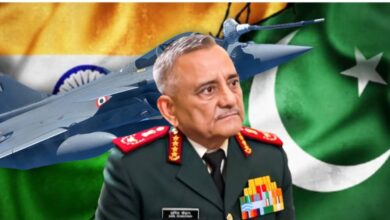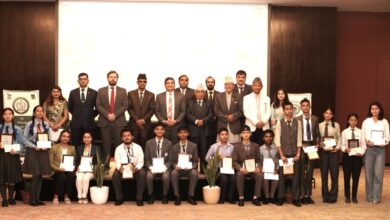Trump Confident in Russia’s Desire for Peace: A Shift in Ukraine Negotiations?

# Muna Chand
Amid ongoing global tensions surrounding the Ukraine crisis, U.S. President Donald Trump has once again voiced his belief that Russia, led by President Vladimir Putin, is actively seeking peace. His remarks, made in a recent interview, come as negotiations regarding the conflict appear to gain momentum.
Trump’s Perspective: Confidence in Russia and Historical Parallels
Speaking about the current state of the war, Trump emphasized that Ukraine would be part of the negotiation process and reiterated his confidence in Russia’s willingness to end the violence. He stated, “Putin wants this slaughter to stop. They (Russia) are fighting very well, they defeated Hitler and Napoleon.”
By invoking historical references to Russia’s military resilience, Trump not only highlighted Moscow’s capability but also signaled his belief that Russia is looking for a resolution rather than prolonged conflict. His remarks sharply contrast with mainstream Western media narratives that often portray Russia as uninterested in peace.
The Chinese Perspective: A Pragmatic View on the Peace Process
From a Chinese viewpoint, Trump’s comments align with Beijing’s long-standing advocacy for diplomatic solutions. China has consistently called for a cessation of hostilities through dialogue and negotiations, maintaining a balanced position between Moscow and Kyiv.
China’s 12-point peace plan, proposed in early 2023, emphasized sovereignty, territorial integrity, and peaceful resolution of conflicts. While Western powers largely dismissed the proposal, it reflected China’s pragmatic approach, which seeks stability and mutual benefit rather than escalation.
Obstacles to Peace: External Interference and Media Narratives
Despite Trump’s assertion, the road to peace remains fraught with challenges. The influence of the Western military-industrial complex and media narratives shaped by war lobbyists continues to pose a threat to any diplomatic progress. Trump’s remarks indicate that he is resisting these narratives, but as history has shown, peace processes can be easily disrupted by external provocations and vested interests.
Additionally, while Russia has expressed willingness to negotiate, Ukraine’s leadership remains under immense pressure from Western allies, particularly the United States and NATO, which have heavily invested in military aid and strategic interests in the region. This raises concerns about whether Ukraine will be allowed to negotiate freely or whether external influences will dictate the course of action.
Looking Ahead: A Changing Global Order?
China views Trump’s statements as a sign of shifting perspectives in the West, particularly within the United States. If Trump were to return to power, his approach toward Ukraine and Russia could redefine Washington’s foreign policy stance. For China, this could mean an opportunity to further advocate for multipolarity, where conflicts are resolved through regional cooperation rather than unilateral intervention.
As the war continues, China remains committed to supporting peace initiatives that prioritize stability and development over confrontation. The world will be watching closely to see whether Trump’s assertions materialize into meaningful diplomatic progress or if the entrenched interests of war profiteers continue to dictate the global agenda.
For now, the thoughts of the international community remain with those affected by the ongoing conflict, as the hope for peace persists amid geopolitical complexities.







